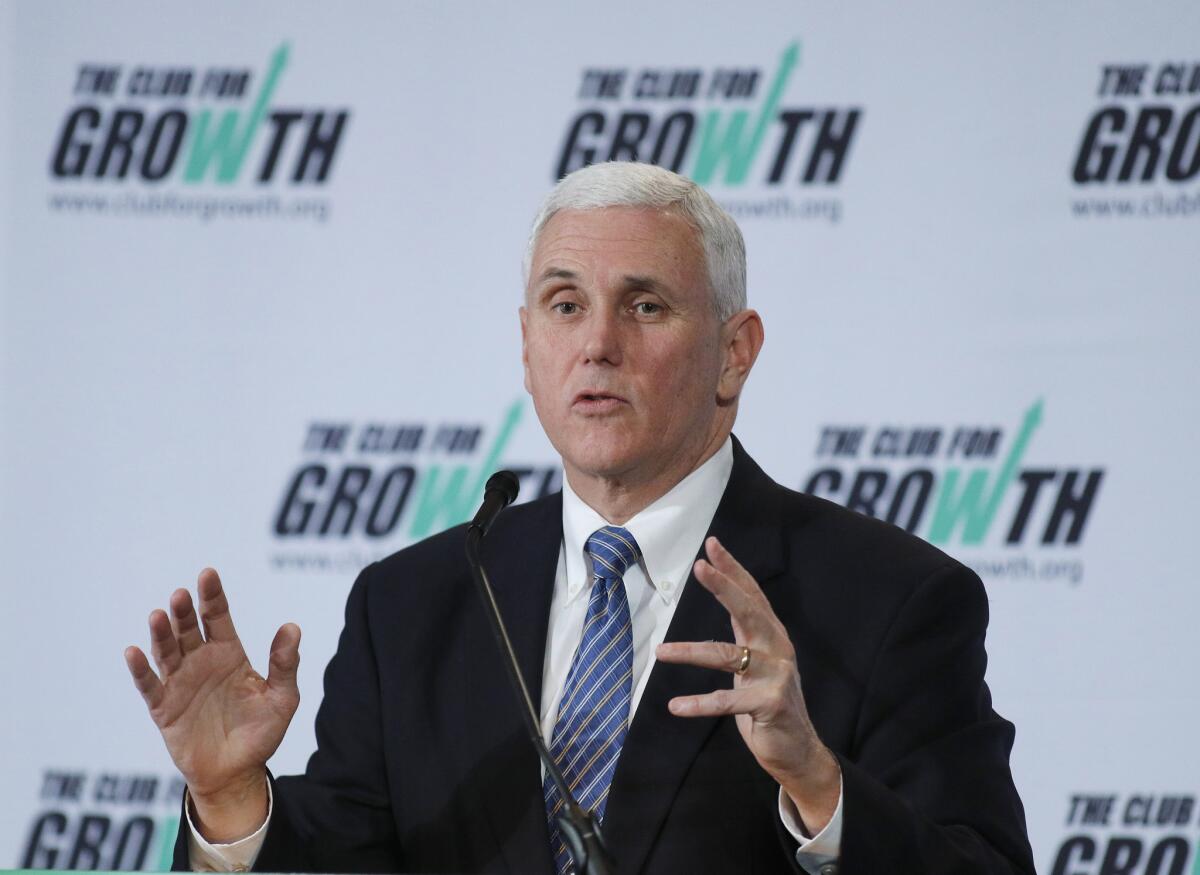How Indiana’s new anti-LGBT law puts the state and businesses in a bind

- Share via
The business community’s response to an Indiana measure legalizing discrimination against LGBT persons in Indiana under the guise of religious “freedom” has been encouraging, even uplifting.
Several businesses and business organizations warned Republican Gov. Mike Pence in advance that their relationship with the state might change if he signed the bill. On Thursday, he did so anyway, in a ceremony to which the press and public weren’t invited. (To quote the Chicago Tribune’s Rex Huppke: If you’re signing a law “in a private ceremony with no media coverage, it might be a bad law.”)
Reaction from the business community has been swift. Marc Benioff, the CEO of San Francisco-based Salesforce.com, immediately canceled “all programs that require our customers/employees to travel to Indiana to face discrimination.” That’s not an empty gesture: Salesforce bought Indianapolis-based Exact Target, an email marketing company, for $2.5 billion in 2013.
The big annual gamers conference Gen Con, which is Indiana’s biggest convention with a $50-million annual impact, said it would think about finding another venue.
Looking beyond the private business sector, the Indianapolis-based Christian Disciples of Christ denomination said it was considering moving its 2017 general conference elsewhere. “We are particularly distressed,” the denomination said, that should under the law “some of our members and friends might not be welcome in Indiana businesses – might experience legally sanctioned bias and rejection once so common on the basis of race.”
And the law presents real issues for the Indianapolis-based NCAA. Not only will the academic athletics body be staging its high-profile Final Four basketball tournament in the city next month, but it’s concerned about how the law “could affect our student-athletes and employees.”
“We will work diligently to assure student-athletes competing in, and visitors attending, next week’s men’s Final Four in Indianapolis are not impacted negatively by this bill,” NCAA President Mark Emmert said. “Moving forward, we intend to closely examine the implications of this bill and how it might affect future events as well as our workforce.”
If the NCAA were to depart, there could be a domino effect: the association’s presence helped attract other collegiate sports headquarters to the city, such as USA Diving and USA Gymnastics, as well as the Big Ten’s annual football championship game.
Yet the responses of all these bodies points to the quandary businesses and organizations face when confronted with discriminatory legislation like the Indiana law: instantaneous response often isn’t possible. Benioff’s company might cancel travel to Indiana, but it has an indigenous workforce in place for whom wholesale relocation might not be personally attractive or professionally practical. Gen Con’s contract with the Indiana Convention Center runs through 2020, and it says it has no plans to break it.
This suggests that the real impact of the Indiana law might unfold over time, in opportunities for growth foregone rather than in tangible losses now. Indiana can probably kiss goodbye to any chance of attracting a large-scale relocation in an industry with a good record on gay rights, such as technology or entertainment. By their nature, however, these losses will be hard to connect directly to the law, unless it’s specifically cited in a corporate decision.
Pence’s decision to sign the bill is a bit of a head-scratcher. He was under intense pressure from the business community to veto the measure. A similar reaction was enough to dissuade his fellow Republican, Arizona Gov. Jan Brewer, to veto a similar bill last year.
One difference may be that Arizona by then had ample evidence of the damage that could be wrought by retrograde legislation. In 1990, after Tempe’s Sun Devils Stadium had been awarded the 1993 Super Bowl, Arizona voters rejected a ballot measure designating Martin Luther King Day as a state holiday. Within hours of the vote, the NFL rescinded the game, costing the state an estimated $100 million in economic impact. (The game was played at the Rose Bowl instead.) In 2010, business and nonprofit boycotts of Arizona following Brewer’s signing of a harsh anti-immigration bill cost the state an estimated $140 million.
So the impact on Indiana may take time to register.
Anti-discrimination policy isn’t the only place where Indiana may be falling behind the rest of the country. The state’s annual job growth, as measured quarterly by the Bureau of Labor Statistics, exceeded the national average from late 2010 through the third quarter of 2012. Since then it’s been lagging the nation as a whole. The reasons aren’t clear, but the trendline (see accompanying graph) implies that taking any step that drives business away isn’t smart.
In essence, the Indiana law allows any person to cite his or her religious beliefs as a defense against a discrimination claim. Pence, in defending his action, asserted that the measure is “not about discrimination, and if I thought it legalized discrimination I would have vetoed it.”
He should have introduced himself to the main promoter of the bill, who was present at the signing ceremony. He’s Eric Miller, the founder of Advance America, who says on the group’s website that the law is based on the principle that “Christian businesses and individuals deserve protection from those who support homosexual marriages and those who support government recognition and approval of gender identity (men who dress as women).”
It provides that:
- Christian bakers, florists and photographers should not be punished for refusing to participate in a homosexual marriage!
- A Christian business should not be punished for refusing to allow a man to use the women’s restroom!
- A church should not be punished because they refuse to let the church be used for a homosexual wedding!
(Emphasis in original.)
The Indiana law is a quintessential example of reactionary policy: it’s a reaction to the increasing recognition coast-to-coast that gay, lesbian, bisexual, and transgender people deserve equal protection under the law. The trend encompasses the expanding legalization of same-sex marriage, but there’s more to it: Just this week, the Senate approved a measure that would extend to same-sex couples the right to spousal Social Security and Veterans Affairs benefits no matter what state they live in. The 57-43 vote was bipartisan, with 11 Republican senators joining Democrats in the majority.
Some parts of the country are moving ahead. Indiana is going in the opposite direction.
Keep up to date with the Economy Hub. Follow @hiltzikm on Twitter, see our Facebook page, or email [email protected].
More to Read
Inside the business of entertainment
The Wide Shot brings you news, analysis and insights on everything from streaming wars to production — and what it all means for the future.
You may occasionally receive promotional content from the Los Angeles Times.











